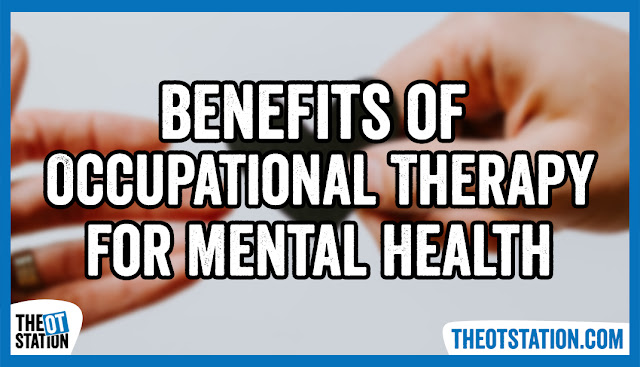Mental health is just as important as physical health. In fact, the two are interconnected, and an imbalance in one can lead to issues in the other. That's where occupational therapy comes in. Occupational therapy can help individuals struggling with mental health issues to improve their quality of life by addressing their daily life activities and routines.
In this article, we'll take a closer look at the benefits of occupational therapy for mental health and how it can improve the lives of those struggling with mental health issues.
What is Occupational Therapy?
Occupational therapy (OT) is a type of therapy that helps individuals of all ages to achieve independence in their daily lives. Occupational therapists help individuals to overcome physical, cognitive, and emotional barriers that prevent them from participating in daily activities such as getting dressed, preparing meals, and going to work or school. OT uses evidence-based interventions and activities to address individual needs, preferences, and goals.
How can Occupational Therapy Help with Mental Health?
Occupational therapy can be used as a complementary treatment for individuals with mental health issues. It can help individuals to overcome emotional barriers that prevent them from participating in daily activities that are essential for their well-being.
Here are some specific ways occupational therapy can help with mental health:
1. Addressing Daily Routines
One of the primary goals of occupational therapy is to help individuals participate in daily routines and activities. This can include activities like getting dressed, preparing meals, and performing household chores. By addressing these routines, individuals can feel a sense of accomplishment and fulfillment in their daily lives, which can have a positive impact on their mental health.
2. Developing Coping Strategies
Occupational therapists can help individuals to develop coping strategies for dealing with stress, anxiety, and depression. These strategies can be tailored to the individual's specific needs and can include mindfulness, relaxation techniques, and cognitive-behavioral therapy.
3. Increasing Social Participation
Social isolation can have a negative impact on mental health. Occupational therapy can help individuals to increase their social participation by teaching them social skills and encouraging them to participate in social activities. This can include joining clubs or groups, volunteering, or participating in hobbies or sports.
4. Improving Self-Esteem
Occupational therapy can help individuals to improve their self-esteem by setting achievable goals and providing positive reinforcement. When individuals achieve their goals, they can feel a sense of accomplishment and self-worth, which can have a positive impact on their mental health.
Examples of Occupational Therapy for Mental Health
Here are some examples of how occupational therapy can be used to address mental health issues:
- Using art therapy to help individuals express their emotions and improve their self-awareness
- Incorporating exercise and physical activity into daily routines to reduce stress and anxiety
- Using sensory integration therapy to address sensory processing issues that can contribute to anxiety and depression
- Providing vocational rehabilitation to help individuals return to work after a mental health crisis.
How to Get Started with Occupational Therapy for Mental Health
Step 1: Identify Your Needs
The first step to getting started with occupational therapy for mental health is to identify your specific needs. Are you struggling with daily activities, such as dressing or grooming? Do you need help managing your time and completing tasks? Are you struggling with social interactions or finding meaning and purpose in your life? Once you identify your needs, you can work with an occupational therapist to create a treatment plan tailored to your specific goals.
Step 2: Find an Occupational Therapist
The next step is to find an occupational therapist who specializes in mental health. You can start by asking your primary care physician or mental health provider for a referral. You can also search online directories, such as the American Occupational Therapy Association's directory, to find a qualified occupational therapist in your area.
Step 3: Schedule an Evaluation
Once you have found an occupational therapist, the next step is to schedule an evaluation. During the evaluation, your occupational therapist will assess your strengths, weaknesses, and goals. They may use standardized assessments to gather information about your physical, cognitive, and emotional functioning. The evaluation will help your therapist develop a treatment plan that is tailored to your needs.
Step 4: Participate in Therapy Sessions
After the evaluation, you will begin participating in therapy sessions. Your therapist may use a variety of techniques to help you achieve your goals. These may include practicing daily living activities, such as cooking or cleaning, using adaptive equipment or technology, practicing relaxation techniques, and engaging in meaningful occupations.
Step 5: Follow Through with Home Exercises
Your therapist may also give you exercises or activities to complete at home. These may include practicing specific skills, such as using a keyboard or managing time, or engaging in enjoyable activities that promote relaxation and stress relief. Following through with home exercises is an important part of the therapy process and can help you make progress towards your goals.
Step 6: Evaluate Progress and Adjust Treatment Plan
As you participate in therapy, it is important to regularly evaluate your progress and adjust your treatment plan as needed. Your therapist will work with you to set goals and monitor your progress. If you are not making progress, your therapist may need to adjust your treatment plan or try different techniques.
Conclusion
Occupational therapy can be a valuable tool for individuals struggling with mental health issues. By addressing daily routines, coping strategies, social participation, and self-esteem, occupational therapy can help individuals to improve their quality of life and achieve greater independence. If you or a loved one is struggling with mental health issues, consider exploring occupational therapy as a complementary treatment option.

